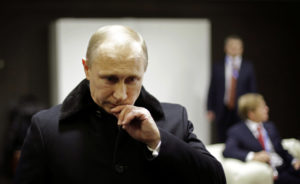Much about the war in Ukraine has been unpredictable. Entirely predictable, though, has been the way stories from history have been mobilised by politicians and pundits to offer “lessons” about the crisis there: why it has occurred, what its consequences will be, and, most of all, what the rest of the world ought to do about it.
The example from history’s portmanteau of analogies which almost everyone has instinctively reached for has been – of course – the Munich Crisis of 1938. What else? No foreign policy drama is complete without a summoning of the ashen shade of Neville Chamberlain onto the stage, as essential to the plot as the ghost of Hamlet’s father.
Back in November last year, Stephen Blank, a senior fellow at the Foreign Policy Research Institute, was already warning that “appeasement of Russia would deliver exactly the same outcome as the betrayal of Czechoslovakia at Munich—dishonor and disaster”. The following month, Rep. Mike Waltz of Florida, a Republican member of the US House Armed Services Committee, tweeted after a visit to Ukraine that “Neville Chamberlain’s appeasement allowed Czechoslovakia, then Poland, then France to fall to Nazi Germany…Biden risks taking the world down the same slippery slope.” Marc Thiessen in the Washington Post solemnly denounced the American President for “channeling his inner Neville Chamberlain” in the matter of Ukraine.
Allusions to Chamberlain’s appeasement are not restricted to one side of the Atlantic. UK defense secretary Ben Wallace detected back in February a “whiff of Munich” about western attempts to dissuade Putin from attacking Ukraine. But there does seem to be a particularly American obsession with routinely digging up the corpse of the Right Honourable Member for Birmingham Edgbaston for a ritual denunciation. Chamberlain himself would presumably be bewildered, as well as horrified if he knew that, 80 years after his death, he is not only well-remembered in a country he never visited during his lifetime, but that his name there has become a byword for catastrophic political failure.
Even a fogginess about the details of what happened at Munich has been no impediment to deploying it. Radio talk show host Kevin James compared President Obama with Chamberlain on MSNBC’s Hardball in 2008, but then had to admit that he had no idea what the former British Prime Minister did exactly in 1938. The magic of the word “Munich” was enough.
Invocations of “Munich”, “appeasement”, and “peace for our time” have accompanied every single American foreign policy crisis of the modern era, from Syria to North Korea to Iran to China. The debate in 2003 about the Bush administration’s decision to invade Iraq was peppered with sententious references to Chamberlain, Munich, and the “lessons of history” (which always, funnily enough, turn out to correspond to whatever the speaker wishes to argue at that given moment).
No American political party has a monopoly when it comes to rubbishing Neville Chamberlain. In a country deeply polarised by partisanship, there is one thing, at least, that everyone seems to be able to agree about: Munich is a dirty word, and appeasement is a strategy of cowards and fools.
But what is it about that September 1938 conference — at which Chamberlain and his French counterpart Édouard Daladier agreed to defer war with Nazi Germany by an accord that ceded the German-speaking Czech Sudetenland to the Third Reich — that has kept people coming back to it?
Munich offers a superficially compelling nugget of wisdom from the past — that seeking any kind of negotiated settlement to a crisis, especially one involving some compromises or concessions to your diplomatic opponent, will only embolden it to make further aggressive demands. Appeasement never prevents conflict with an ambitious rival power; it merely postpones it. When it does break out, it will do so under conditions that have become more favourable to them than to you because of your naïve attempt to conciliate them. The only strategy that is respected in great power politics is uncompromising deterrence. Conceding even the slightest point, exercising even the slightest restraint, is an admission of weakness in a world that values only strength.
On the face of it, the historical Munich seems to provide a persuasive demonstration of just that truth. Chamberlain and Daladier did offer concessions to Hitler (without reference to the Czechs whose territory they were handing over) in the hope that this would represent a lasting settlement of European affairs. Hitler agreed, for his part, that he had no more territorial demands and that henceforth he would practice only peaceful diplomacy — then six months later, ripped up the treaty by annexing Bohemia and Moravia and threatening war with Poland over the fate of Danzig.
War was only postponed by a year, and some historians have argued (though the matter is far from clear) that Nazi Germany began fighting it in a far stronger position than in 1938. What otherwise would have been the relatively brief destruction of Hitlerism was made into a calamitous six-year conflict that killed perhaps 85 million people.
The Munich analogy does more than just lay out this seemingly unchallengeable insight. It also implies that the latest antagonist, whomsoever that might be — Saddam Hussein, Bashar al-Assad, Mahmoud Ahmadinejad, Vladimir Putin — is the new Hitler: a mad dog, insatiable in his murderous demands, representing an urgent existential threat to western life. It implies that anyone foolish and unworldly enough to try to meet such a monster half-way is the new Chamberlain, complete with grey hair, starched wing collars, and the look of a baffled, rather put-upon clerk. Perhaps most important of all, it implies that the speaker is the new Churchill – the indefatigable defender of liberal democracy who can see through the facile temptations of appeasement (never mind that the real-life Churchill had a rather mixed record when it came to seeking accommodation with dictators, from Mussolini to Stalin). The Munich analogy conveniently demonises, tarnishes, and flatters.
It also turns the story of Thirties appeasement into a trite morality tale rather than the complex story about the possibilities and limitations of great power politics in a democratic age that it actually was. What Chamberlain did at Munich was framed by his belief that Britain and France did not yet offer a credible deterrent to German military power, and that neither his country nor the empire it led was psychologically prepared in 1938 for a second brutal world war. Whether he was right or wrong about this is a matter for counterfactual speculation only. But it was a position that was endorsed by all the professional military advisors that he had to call on.
Chamberlain did believe, wrongly, that he understood Hitler and that the Nazi leader was a fundamentally rational actor with limited goals – the former managing director possessed the conceit, not uncommon in businessmen who later turn to politics, that he was a master of the art of the deal. Chamberlain sincerely hoped that he had secured peace at Munich. But his fallback position was that, if Hitler continued to make demands, then Britain could turn to deterrence rather than appeasement once its rearmament program (which Chamberlain’s government had been spending vast amounts of money on since 1934) was sufficiently advanced. And if deterrence failed then it was necessary to exhaust every reasonable possibility of peace first. This was partly because that was inherently the right thing to do — a second war with Germany would unleash untold new horrors on the world, though Chamberlain expected, in the end, that Britain would win it.
More practically, though, it was vital to demonstrate to domestic and international audiences that Britain had truly been left with no alternative but to go to war. What appeasement did was not so much “buy time”, as is sometimes suggested, but buy legitimacy, particularly in the eyes of important neutral nations such as the United States. Had war broken out over the Sudetenland in 1938, many Americans would have regarded it as just another pointless European squabble that their country was well advised to keep out of. President Roosevelt, even if he had had the mind to do so, would have found it much more difficult to revise the Neutrality Acts to assist the Allies, a blow to the British and French war effort of which it is impossible to calculate the exact effects — but which certainly would have been serious.
It’s interesting, that while allusions to Munich were flying thick and fast in America during the weeks leading up to Putin’s invasion of Ukraine, they are rather less in evidence now that the war is upon us. Probably this has something to do with the Republican Party’s schizophrenic attitude towards Putin, with its traditional neo-conservative hawks finding themselves outflanked on the populist right by Trumpian isolationists who see no reason to quarrel with the Russian leader.
But it might also be the case that the Munich analogy has finally collided with some cold hard facts about confrontation with a nuclear-armed state. Despite all the hyperbolic American rhetoric at the time about new Hitlers, it was possible to contemplate earlier wars with non-nuclear powers such as Iraq or Iran precisely because they didn’t represent an existential threat to the United States — any war with them would be, relatively speaking, low stakes.
Clearly that is not the case in Ukraine, given the hundreds of ICBMs Putin has pointing at the North American continent. The fact is that the logic of Mutually Assured Destruction means that escalation with such an opponent risks suicide. No amount of talk about “the lessons of history” will change that.
So either Ukraine represents a brief hiatus in the enduring popularity of the Munich analogy. Or it reflects a new consciousness that some opponents are simply too dangerous to forego entirely the idea of negotiation, compromise, and restraint — and even appeasement.
Disclaimer
Some of the posts we share are controversial and we do not necessarily agree with them in the whole extend. Sometimes we agree with the content or part of it but we do not agree with the narration or language. Nevertheless we find them somehow interesting, valuable and/or informative or we share them, because we strongly believe in freedom of speech, free press and journalism. We strongly encourage you to have a critical approach to all the content, do your own research and analysis to build your own opinion.
We would be glad to have your feedback.
Source: UnHerd Read the original article here: https://unherd.com





